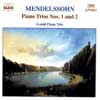Mendelssohn piano Trios Nos 1 & 2
Two views of Mendelssohn – the Romantic and Classical – each with something to offer
View record and artist detailsRecord and Artist Details
Composer or Director: Felix Mendelssohn
Genre:
Chamber
Label: Naxos
Magazine Review Date: 2/2002
Media Format: CD or Download
Media Runtime: 57
Mastering:
Stereo
DDD
Catalogue Number: 8 555063

Tracks:
| Composition | Artist Credit |
|---|---|
| Piano Trio No. 1 |
Felix Mendelssohn, Composer
Felix Mendelssohn, Composer Gould Piano Trio |
| Piano Trio No. 2 |
Felix Mendelssohn, Composer
Felix Mendelssohn, Composer Gould Piano Trio |
Author:
Formed in 1968 and 1987 repectively‚ the Trio di Milano (with a change of violinist in 1981) and the Gould Piano Trio can both boast extensive concert engagements. But apart from Benjamin Frith (a wellknown Mendelssohn devotee) the English team are less familiar on disc‚ which may help to explain why their Naxos coupling of Mendelssohn’s two piano trios is offered as a superbargain‚ whereas for the Assai issue you must pay full price.
In their different ways I found much to enjoy in both. But are these differences commensurate with the difference in price? The Italians give a much stronger impression of being in a recording studio‚ where pursuit of perfection in musical detail as well as sound quality is the prime concern‚ whereas the English feel more ‘live’‚ with the impulse and ardour of the moment the overriding factor. In other words the Italians‚ with their marginally slower tempo‚ present a more Classical Mendelssohn whereas the English emphasise the Romantic.
Neither booklet gives any indication of when‚ where or by whom each recording was made. But in respect of sound per se‚ the accolade must go to the Italians for their greater clarity in what seemed to me a slightly less resonant studio. Try the Scherzo of the D minor Trio for example‚ where the brilliant semiquaver figuration from the English team lacks the Italians’ pinpoint definition. But in warmth and fullness of climaxes elsewhere the Naxos engineers rarely disappoint.
Space precludes detailed movement by movement comparison. But in both slow movements I thought Frith’s phrasing more sensitively beguiling than that of his Italian counterpart‚ whereas the glorious golden tone and eloquence Rocco Filippini draws from his Stradivarius cello (the Gore Booth ‘Baron de Rothschild’) brings extraspecial rewards of its own.
Though separated by six years‚ the two works reveal the composer content with much the same pattern: a songlike slow movement and a woodland spriteridden Scherzo between two molto agitato outer movements in Classical sonata form. Not even in the Beethoveninfluenced later work‚ with its fullhearted‚ hopebringing‚ choraleinfused finale‚ does Mendelssohn seek profundity. Both works demand sparkling spontaneity and vitality – sometimes virtuosity too. For this reason I’ll end by urging prospective purchasers not to forget the enjoyable Prague Guarneri Trio’s coupling from last year (Praga Digitals). For anyone with jaded ears in the context of this composer’s music‚ the immediacy and freshness of these players is a tonic.
Discover the world's largest classical music catalogue with Presto Music.

Gramophone Digital Club
- Digital Edition
- Digital Archive
- Reviews Database
- Full website access
From £8.75 / month
Subscribe
Gramophone Full Club
- Print Edition
- Digital Edition
- Digital Archive
- Reviews Database
- Full website access
From £11.00 / month
Subscribe
If you are a library, university or other organisation that would be interested in an institutional subscription to Gramophone please click here for further information.




